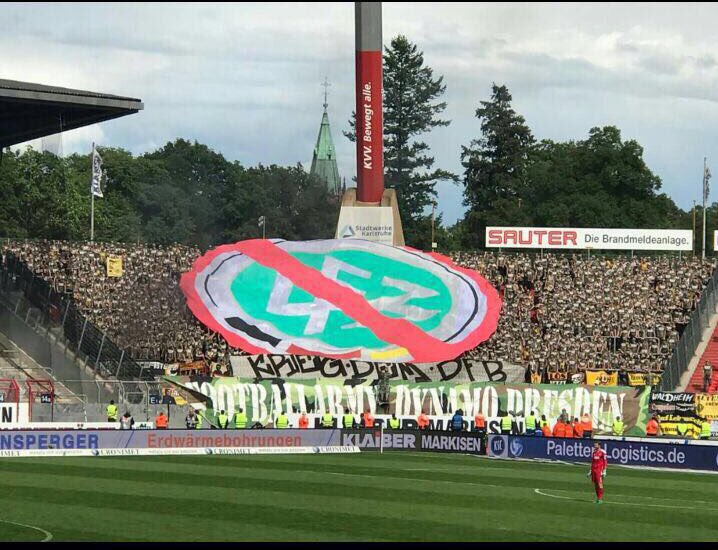Borussia Dortmund beat Eintracht Frankfurt 2-1 on Saturday to claim their first major piece of silverware since 2012. But the game was overshadowed by fan protests against increasing commercialism in German football.
Ten minutes before kick-off in the DFB Pokal final between Eintracht Frankfurt and Borussia Dortmund, the disparaging chants against the German FA (DFB) were clearly audible. “Scheiß DFB! Scheiß DFB!” roared both sets of fans, the chant echoing back and forth across Berlin’s Olympic Stadium as the fans responded to each other, before morphing into “football mafia DFB!”
When former German figure skater Katarina Witt carried the 52cm high, 5.7kg heavy German Cup through the Marathon Gate at the West End of the stadium and onto the pitch, the atmosphere took on a more hostile hue. Dortmund supporters ignited pyrotechnic devices of every sort, creating a backdrop of smoke, fire and flashes to Witt’s carefully choreographed entrance.
Such was the intensity of the display, the whole Dortmund half of the pitch was still shrouded in a yellow haze for the first five minutes of the match – and it’s doubtful whether many of the 20,000 plus supporters who had made the trip from western Germany even saw Ousmane Dembelé’s fine piece of solo trickery as he fired Dortmund into the lead in the eighth minute.
At half-time, Ante Rebic having equalised for an impressive Frankfurt, the protests continued, deafening boos and whistles raining down on German pop star Helene Fischer as she performed her new single. Clearly, the 70,000 supporters weren’t enjoying the DFB’s “half-time show.”
As the second half kicked off, it was the Frankfurt fans’ turn. Dozens of flares lit up the East End of the stadium as the stadium announcer appealed to the fans to “refrain from burning pyrotechnic devices” – in vain. Apparently having some flares left over, the Dortmund fans joined in. “You are only harming each other and your own club” continued the PA announcer wearily.

In the second half, there was more to come as the Dortmund fans displayed a large black banner declaring “War on the DFB” – echoing the supporters of second division outfit Dynamo Dresden. In south-western Karlsruhe two weeks ago, Dresden fans had marched to the stadium in matching camouflage uniforms behind a military jeep and a banner bearing the same motto.
"War on the @DFB" #kscsgd

Why the protests? Why the continued – and increasing – use of pyrotechnics? The cup final provided the answers as well as the questions. Booming music, an overly-excited stadium announcer, a choreographed entrance for the trophy, a half-time show. In the eyes of the supporters, the German FA seem intent on turning their game into pure entertainment, a German Superbowl.
The future of German football
Why is that a problem? Because German football supporters are not Superbowl fans and they don't see football as an event. They consider themselves to be active and integral elements of their clubs (and indeed, in most cases, they own them). Being fed with pop music and a half-time show, on the other hand, is considered passive and consumerist and therefore entirely at odds with the fans’ very identity.
The same sense of disenfranchisement among traditional supporters can be seen in protests across German football every single week – reaching its peak this season when RB Leipzig fans were attacked outside Dortmund’s Westfalenstadion in February.
Just as the boos and whistles in Berlin were not aimed specifically at singer Helene Fischer herself, the explosion of violence and anger against RB Leipzig was not solely directed at that one club. Rather, RB Leipzig, founded in 2009 and owing its existence entirely to Red Bull, is considered by fans to represent all that is wrong with modern football. A commercialised football where corporations use the game for their own marketing purposes rather than the other way around. A game which is slowly being torn away from its core fanbase.
In England, the sorry stories surrounding Blackpool, Lincoln, Wimbledon and others are proof of the dangers of promoting commercial interests above the interests of a football club. It’s the reason between 700-800 UK fans attend every Borussia Dortmund home game. They don’t go because they want passive entertainment, they can go to Disneyland (or the Emirates, or Leipzig) for that. They go because they want to stand, drink, sing and play a part instead of being treated as a paying customer.
German football is perceived to represent a final bastion, where the game still belongs to its supporters, but events this season and at the cup final showed that the German FA is moving the game in a direction which isn’t to everyone’s taste. They should consider what German football’s primary USP is, to use their language, before heading down the same route as the Premier League.

